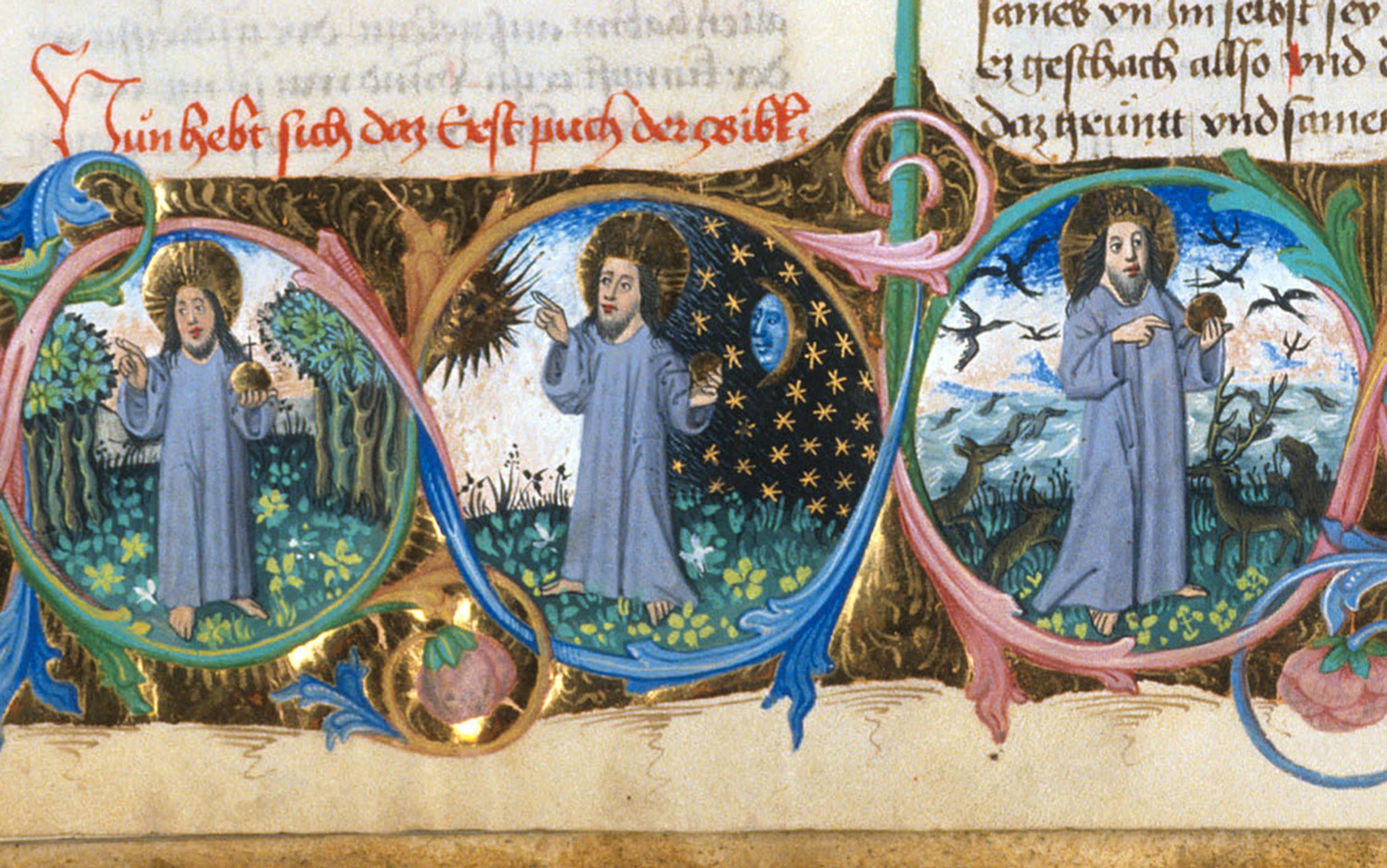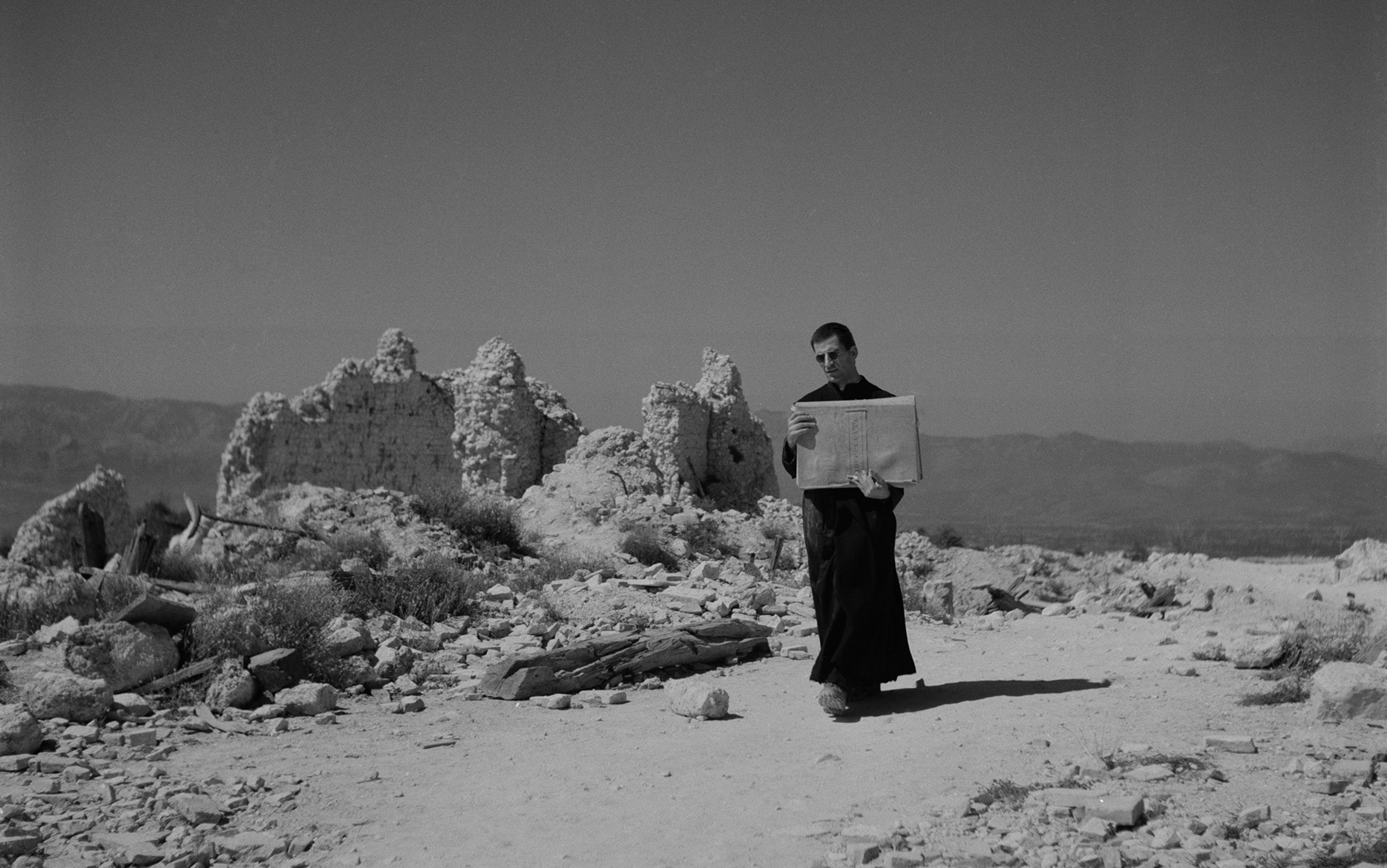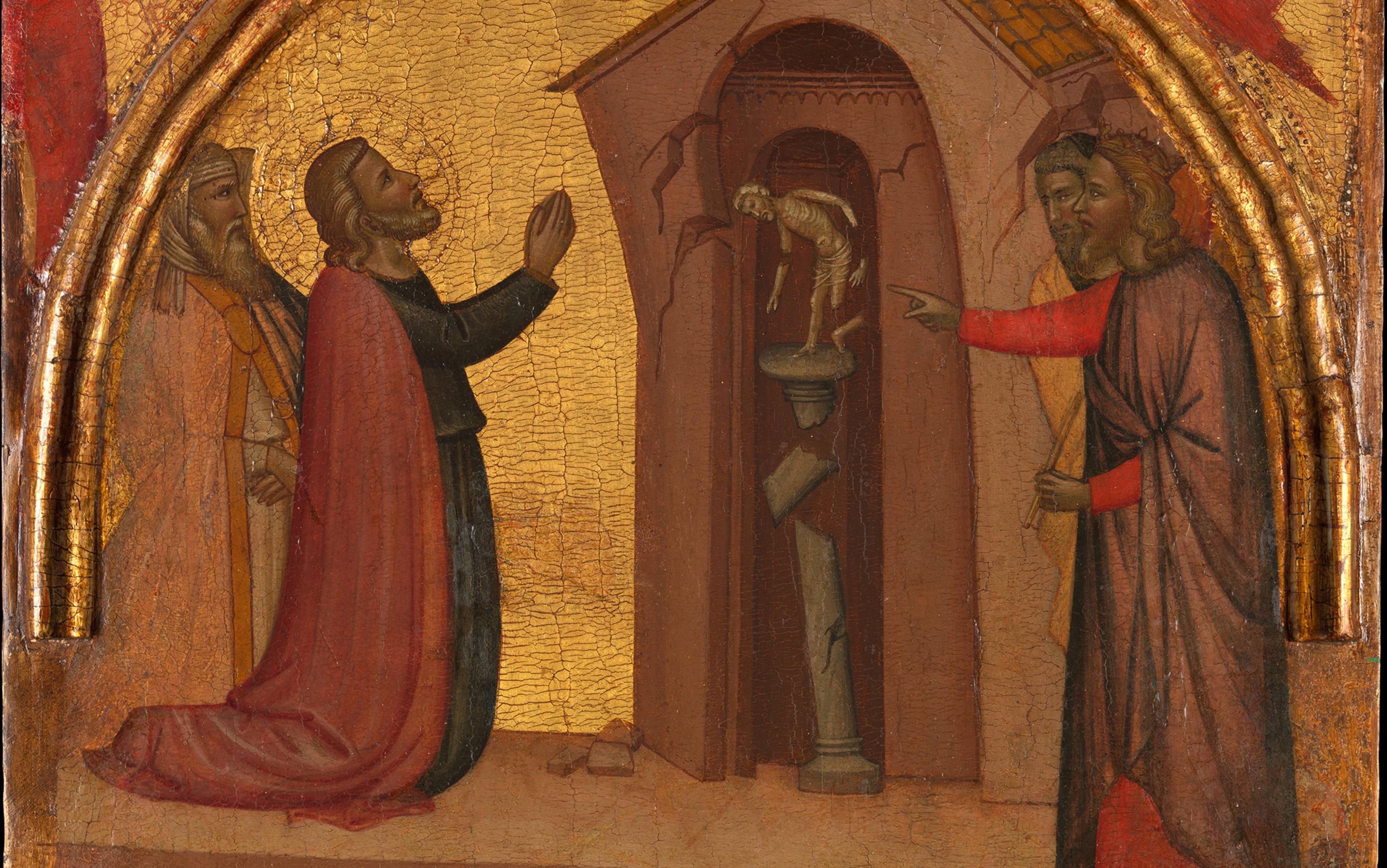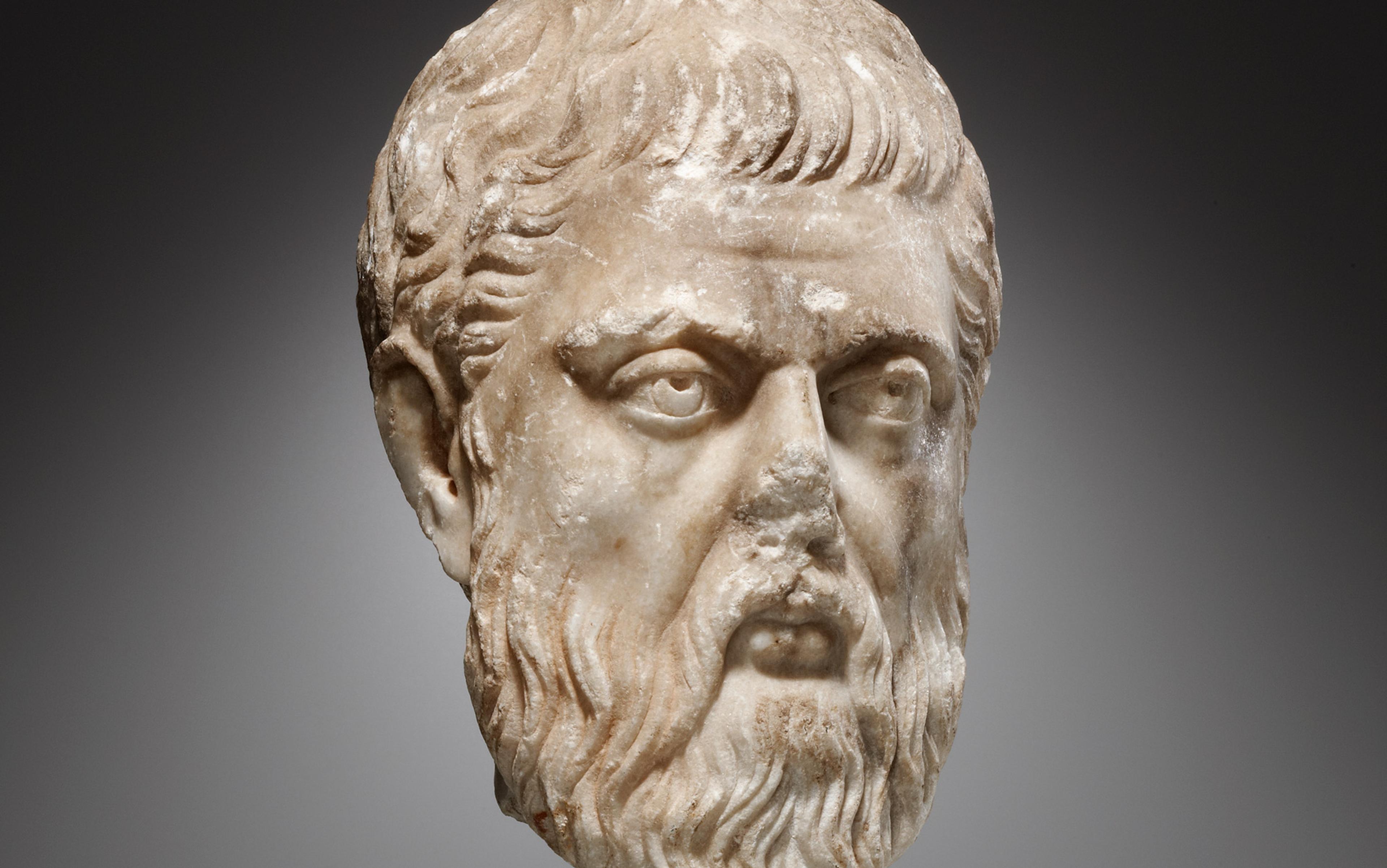In the early 3rd century BCE, the biblical book of Genesis was translated from Hebrew into Greek in order to be read by the Jewish communities of the diaspora who no longer understood Hebrew. Though the book could now be read by non-Jewish Greeks, it did not incite much commentary or hostility because Judaism was not a missionary religion. Most Greeks felt no need to quarrel with the Jews. But with the rise of Christianity – a decidedly missionary religion – the situation changed. Christians adopted the Greek Bible from the Jews, and in their proselytising efforts they confronted non-Jews with this book, which they took to prove that the coming of Christ had been predicted by Moses and the prophets. Between the 2nd and 4th centuries CE, pagans struck back against the new Christian challenge, arguing that the Greek Bible (the Old Testament) was an inferior work, confused and philosophically unsound. There are three Platonist philosophers who stood foremost in the philosophical fight against the Christians and their book of Genesis: Celsus, Porphyry and Julian the Apostate.
Celsus, the first pagan writer known to have drawn extensively on Genesis, wrote his massive anti-Christian work The True Doctrine between 175 and 180 CE. It does not survive. But some 70 years later, his book at last received its equally massive counterattack in the Christian scholar Origen of Alexandria’s work Against Celsus (c248 CE). Origen’s book contains extensive quotations and paraphrases of Celsus, allowing us to examine the role that Genesis played in his polemics against Christians and Jews. As with other later Platonists, Celsus firmly believed that the ‘true doctrine’, which is of divine origin, is to be found in the age-old traditions passed on since time immemorial by wise ‘barbarian’ (that is, non-Greek) nations, such as the Egyptians, the Assyrians, the Indians, etc. There is, he says, an ancient doctrine that has existed from the beginning of time, and has always been maintained by the wisest nations and most perspicacious humans. But much to Origen’s indignation, Celsus excludes the Jews from this list. Celsus argues that the Jews, instructed by Moses, perverted this tradition by insisting that there is only one God, and by abandoning the customs and practices that are part and parcel of this old tradition. In fact it is precisely this novelty that disqualifies the Jews from taking their position among the wise ‘barbarians’.
In Celsus, we find for the first time all the major issues in the debate about the Bible between Christians (and, by implication, Jews) and the Greco-Roman intellectuals that remained standard topics from then on. The arguments sometimes sound surprisingly modern. These include the utter lack of literary quality of the Bible, the glaring contradictions between the various biblical books, and the chronological inconsistencies. The Bible is also charged to be a product of plagiarism containing highly implausible prophecies and, most importantly, promoting a philosophically untenable concept of God – a God that is anthropomorphic.
Celsus says that Moses’ story of the creation shows that the author had no idea of what the nature of the world and of humankind really is, so Celsus regards it as sheer nonsense. That the highest God speaks for six days and then has to rest from fatigue at the seventh is a patent absurdity: ‘It is not fitting for the first God to be tired or to work with his hands or to give orders,’ he writes. What’s more, to divide the creation process into several days when the sun and the stars did not yet exist (and when there was not yet a circular motion of the cosmos) does not make any sense. ‘For when the heaven had not yet been made, or the earth not yet fixed, or the sun borne round it, how could days exist?’ It is impossible, Celsus says, that God made humans in his own image, for God is not of this sort nor is he like any other form. As regards the paradise story, that a serpent proved superior to the ordinances of God is no more than mere superstition. And the story that Adam and Eve acted against God’s commandment has the impious implication that, from the start, God was too weak to persuade the persons he himself had created to be obedient.
Celsus also rejects the anthropocentric view of creation, that is, the notion that the cosmos was formed for the sake of humankind. He says there is no reason to assume that things in nature grow more for people than for irrational and wild animals (thus he interprets the invocation ‘be fruitful and increase in number; fill the earth and subdue it’). Celsus had very serious doubts about the subordination of the animal kingdom to that of human beings. ‘If anyone calls us rulers of the irrational animals because we hunt and eat them,’ he writes, ‘we will reply by asking why rather were we not made for their sake since they hunt and eat us?’ It is usually easier for animals to subdue humans with their natural powers than the other way round.
Celsus belongs to the branch of later Platonism that interprets Plato’s most influential work, the Timaeus, to mean that the world was not created in time, and hence is indestructible. So the idea that God wants to destroy the world, as in the story of the Flood, is illogical. That story is false and should be seen as nothing but a plagiarised version of the Greek flood myth of Deucalion and Pyrrha, or perhaps as a misunderstanding of the Greek doctrine of the periodical cycles of floods and conflagrations. As Celsus says: ‘The world is uncreated and indestructible, and only things on earth are subject to floods and conflagrations, but not all of them at the same time.’ Celsus finds it unworthy of a deity that the biblical God was sorry that he had created humankind and decides to annihilate his own creatures. A God who repents, who changes his mind, cannot truly be a God because a true God is by definition unchangeable and never undergoes any mutation. Moreover, if God destroys his own creatures because they are evil, then God himself must be the origin of evil, which is – again – not worthy of a God. To Celsus, and many anti-Christians after him, the concept of God is fundamentally flawed.
The picture changes with Porphyry, the most important and influential student of Plotinus (who founded Neoplatonism). Porphyry was born around 232 CE in Tyre (modern-day Lebanon) and died some 70 years later in Rome. Although some of his works have been handed down intact, the major part of his vast output is either completely lost or has been preserved only in fragmentary form. In some of his works on religion, Porphyry speaks about the Jews and their beliefs and practices. His attitude towards Judaism and its Bible might seem ambiguous at first sight: on the one hand, he severely criticises the Jewish Bible; on the other, he regards the God of the Jewish people as the highest divinity, and the Jews as belonging to the wise nations that possessed the primordial wisdom.
Porphyry’s polemical remarks are mostly found in his major work Against the Christians, which also does not survive since all copies were ordered burned by the Christian emperors of the 4th century CE. It is not Judaism but Christianity that is his main target here, but he slams Christianity by criticising its Jewish matrix. For instance, he accuses the Christians of having become ‘zealots for the strange mythologies of the Jews’. He gives an example of the latter when he says: ‘Why did God forbid the knowledge of good and evil? He forbade the evil, rightly so, but why also the good? For in saying, “Of the tree of the knowledge of good and evil thou shalt not eat” (Genesis 2:17) he says that he prevents him from knowing the evil, but why also from knowing the good?’ To a Platonist such as Porphyry the idea of a deity preventing humankind from knowing the good, which is the essential quality of the Platonic god, is a very ‘strange mythology’ indeed. The fact that God threatens Adam and Eve with death is in contradiction with the Platonic idea that God wills only the good. Again, as with Celsus, it is the flawed biblical notion of God that is the main target of his criticism. All the more surprising, throughout the same work, Porphyry never ceases to emphasise that the Christians committed a grave error by abandoning the old and venerable traditions of the Jewish religion – it is the newness of the Christian faith that is its most fatal defect.
Porphyry’s positive statements about the Jewish Bible, especially Genesis, bring out this point. In one of his works he approvingly quotes the 2nd-century Platonist philosopher Numenius to the effect that the Jews believe that ‘the souls rest on water, which is divinely animated’, and that for that reason ‘the prophet had said that the spirit of God is moving over the water’. Here Genesis 1:2 is said to be the words of ‘the prophet’ Moses. In a similar vein, in a discussion of how the soul enters the newly formed embryo, Porphyry says: ‘The theologian of the Hebrews also seems to signify this when he says that, when the human body was formed and had received all of its bodily workmanship, God breathed the spirit into it to act as a living soul,’ an unmistakable reference to Genesis 2:7. That Moses is called here ‘the prophet’ and ‘the theologian’ without any qualification is certainly remarkable. Porphyry finds Moses to be in support of his own philosophical views on the ‘ensoulment of the body’.
‘Plato is nothing but a Moses who speaks Greek’
The most remarkably positive and sympathetic statements about Jews and their Bible are found in Porphyry’s work On Philosophy to be Derived from Oracles. In it, Porphyry quotes a number of oracles – mostly those of Apollo – from various locations around Greece and Asia Minor. Several oracles mention the Jewish faith in a highly approving manner. At first sight, that might seem surprising: why would a Greek oracular deity make positive statements about Judaism? But this phenomenon fits well into the cultural atmosphere of the time.
Porphyry even has his own god (Apollo) bear witness to the wisdom of the Hebrew nation as well as of other ancient nations renowned for wisdom and insight. Speaking about sacrifices, Apollo says:
Steep and rough is the road to the blessed ones [gods], entered at first through portals bound with bronze. Inside these are innumerable paths, which for the endless benefit of humankind were first revealed by those who drink the sweet water of the land of the Nile. The Phoenicians, too, learned many paths to the blessed ones, as did the Assyrians, the Lydians and the nation of the Hebrews.
Porphyry then comments that, as far as the paths to the gods are concerned, the Greeks have gone astray; it is in fact the wise barbarian nations, including the Jews, who have found them. By way of confirmation, he adds another oracle of Apollo: ‘Only Chaldaeans and Hebrews found wisdom in the pure worship of a self-born God.’ On the basis of these oracles, Porphyry states that the Jews have a theology that is far superior to the Christian one.
It seems amazing that Apollo (or, more precisely, his priests) would have spoken in such a positive vein about the God of the Jews and Moses, and that Porphyry quotes several of these oracles approvingly. But Porphyry’s attitude is not actually that exceptional. The Platonist Numenius, a contemporary of Celsus, held the Jewish Bible in high esteem. Numenius, like others, cherished the idea that some of the ancient non-Greek nations had traditions containing an old and primeval doctrine of profound truth and wisdom (the ‘True Doctrine’ of Celsus). Unlike Celsus, however, Numenius includes the Jews in this list of ‘nations of high repute’. He goes even further, for according to him the Jews were more important than all other nations of high repute, which can best be illustrated by his expression of a deeply felt admiration for Moses in his saying that ‘Plato is nothing but a Moses who speaks Greek’ because he saw an essential agreement between their teachings. In the eyes of Numenius, Judaism was a philosophy as lofty as, and in agreement with, Platonism. Numenius calls Moses ‘a man most powerful in prayer to God’, he quotes Moses and the prophets in many of his writings, and interprets them allegorically.
Porphyry often quotes Numenius to the effect that Moses’ writings evince profound wisdom. The influence of Numenius on Porphyry was very great, so much so that, unlike Celsus, Porphyry did not extend his disdain for Christianity to Judaism. This influence, and also that of Apollo’s oracles, explains why, in spite of his remark about ‘strange mythologies’ when referring to the story of Paradise in Genesis 3, he is nonetheless able to express his admiration for the idea of God’s spirit moving over the waters in Genesis 1. This might sound self-contradictory to us, but for Porphyry it apparently was not. His admiration for the traditional nature of Judaism might not have included some biblical narratives that he called ‘mythologies’ since they could not be allegorised. Maybe he regarded the Jewish Bible as a book containing both ‘strange mythologies’ and profound truth. Or maybe he was critical of the Jewish Bible only if he could hit the Christians with his criticisms. But most likely, his hatred of Christianity was simply stronger than his admiration for Judaism.
The final great pagan opponent of Christianity was the emperor-philosopher Julian the Apostate (331-363 CE), so called because of his conversion from Christianity to Neoplatonism. He ruled the Roman Empire for only the final two years of his life, and during his short reign he did his utmost to restore and promote pagan Hellenism at the expense of Christianity. His major literary attack on the Church, Against the Galileans, underwent the same fate as the anti-Christian writings of Celsus and Porphyry: we have only fragments quoted by his later opponents (especially, in Julian’s case, the bishop Cyril of Alexandria in his Against Julian). In his polemics, Julian pays attention to the book of Genesis, particularly its early chapters. He admired Judaism because it adhered to its ancestral traditions and he castigated Christianity for its having abandoned these traditions, especially Judaism’s sacrificial worship. His attempt to rebuild the temple in Jerusalem was part of his programme to restore ancient religious practices. Yet that did not prevent him from regarding many Old Testament passages as absurd (for one, he does not think Moses is a prophet). Julian compares Moses’ cosmogony to that of Plato. He quotes large stretches of Genesis 1 and then remarks:
In all this (…) Moses does not say that the deep was created by God, or the darkness or the waters. And yet, after saying concerning light that God ordered it to be, and it was, surely he ought to have gone on to speak of night and the deep and the waters as well. But of them he says not a word to imply that they were not already existing at all, although he often mentions them. Furthermore, he does not mention the creation of the angels or in what manner they were brought into being, but deals only with the heavenly and earthly bodies. It follows that, according to Moses, God is the creator of nothing that is incorporeal but is only the disposer of matter that already existed. For the words: ‘And the earth was unsightly and without form’ (Genesis 1:2) can mean only that he regards the wet and dry substance as the original matter, and that he introduces God as the disposer of this matter.
According to Julian, Moses’ cosmogony is incomplete. Darkness, the deep and the waters are not said to have been created (God did not say: ‘Let there be darkness’ etc), so they must have been pre-existent. The fact that angels are not mentioned implies that Moses’ God did not create spiritual beings. For Julian, Moses’ God was nothing but an ‘arranger’ of preexisting, non-created matter. Hence he cannot have been the Supreme God, who is the ultimate creator of all things. On other points as well, Julian argues that Plato’s Timaeus makes much more sense as a cosmogony than Genesis 1.
God should have been the wisest of all living beings yet commits a mistake that amounts to sheer stupidity
Like his predecessors, Julian is baffled by God’s prohibition against eating of the tree of knowledge. He calls this prohibition a ‘climax of absurdity’:
Is it not utterly absurd that God should deny to the human beings he has created the power to distinguish between good and evil? What could be more foolish than being unable to distinguish good from bad? For it is evident that he would not avoid the latter, I mean evil things, nor would he strive after the former, I mean good things. In short, God refused to let the humans taste of wisdom while nothing could be of more value to humans than that. For that the power to distinguish between good and evil is the hallmark of wisdom is evident even to the witless.
Here Julian emphasises, even more strongly than Porphyry, that the Jewish creator God, who should have been the wisest of all living beings, commits a mistake that amounts to sheer stupidity. The same verdict applies in his view to the story of the fall in Genesis 3:
God had said: ‘It is not good that the man is alone. Let us make him a helper corresponding to him’ (Genesis 2:18). Yet so far was she from helping him at all that she deceived him, and was in part the cause of his and her downfall from their life of ease in Paradise. These are totally mythical tales. How could it be probable that God did not know that the being he was creating as a helper would prove to be not so much a blessing as a misfortune to him who received her?
If one is not willing to believe that God is ignorant (which one should not), the only reasonable conclusion is that this story is completely false. A real God is not such as he is described here. Julian also criticises the depiction of God as envious when he wants to prevent Adam and Eve from ‘becoming like one of us’ and ‘living forever’ (Genesis 3:22), and he concludes by saying that these mythical stories ‘are filled with many blasphemous sayings about God’. Again, it is this very concept of God that is at issue, a subject that fascinated Greeks throughout the era.
From about 500 BCE, Greek philosophers took a critical attitude towards the traditional stories about the gods. Xenophanes of Colophon (c570-475 BCE) played a seminal role in this movement. A central element in this criticism of traditional mythology was the concept of ‘what is fitting to a god or worthy of a god’. There was a growing awareness that human affections and emotions, such as jealousy, lust and anger were unfittingly and unjustly ascribed to the gods in the mythological tales of the tradition, such as those attributed to Homer. The influence of this idea can already be seen in the 5th-century BCE tragedian Euripides when he has one of his characters in Bacchae say that ‘it is not fitting for gods to be like mortals in matters such as fits of anger’.
Plato (who wanted to banish Homer’s poetry from his ideal state) developed the idea of a non-anthropomorphic God into that of an impersonal, immaterial and transcendent being, a God who is – in his definition – ‘that which is always in the same unchanging state’, a God who neither speaks nor acts. Plato’s influence made this idea the central theological notion in the centuries after him. His theory of the essential and absolute goodness and unchangeability of the divine, an impersonal world in which there is no place for emotions such as wrath or jealousy, then conquers the intellectual world, albeit slowly, and becomes an unwritten dogma of the religious philosophy of later antiquity.
Initially this influence limited itself to the world of philosophical and religious thinkers. For instance, Epicurus writes in the very first sentence of his Principal Beliefs that what is divine cannot be moved by either wrath or grace. And the Roman philosopher and orator Cicero states that if we would take Epicurus’ argument into consideration, all fear of the power and anger of the gods would be banished. Dispelling the fear of the wrath of the gods was one of the major motives for the poet-philosopher Lucretius to write his The Nature of Things. The Stoic position is similar: myths have been a fruitful source of false beliefs and superstitions. As the Stoic Balbus says:
We know what the gods look like and how old they are, their dress and their equipment, and also their genealogies, marriages and relationships, and all about them is distorted into the likeness of human frailty. They are actually represented as liable to passions and emotions – we hear of their being in love, sorrowful, angry; according to the myths, they even engage in wars and battles, and that not only when as in Homer two armies are contending, and the gods take sides and intervene on their behalf, but they actually fought wars of their own, for instance with the Titans and with the Giants. These stories and these beliefs are utterly foolish; they are stuffed with nonsense and absurdity of all sorts.
Julian the Apostate states programmatically that, in the Greek philosophical tradition: ‘God is nowhere presented as angry, or resentful, or wrathful, or taking an oath, or inclining first to this side and then suddenly to the other, or as turned from his purpose, as Moses tells us.’ And here we have the central problem: Greek and Roman philosophers criticised the Bible first and foremost because it presented the deity in terms that were utterly unacceptable to them. The biblical God is a passionate God, a capricious God – not the austere, immobile, unchanging God that Greco-Roman philosophers argued for. It was a debate they would lose.






